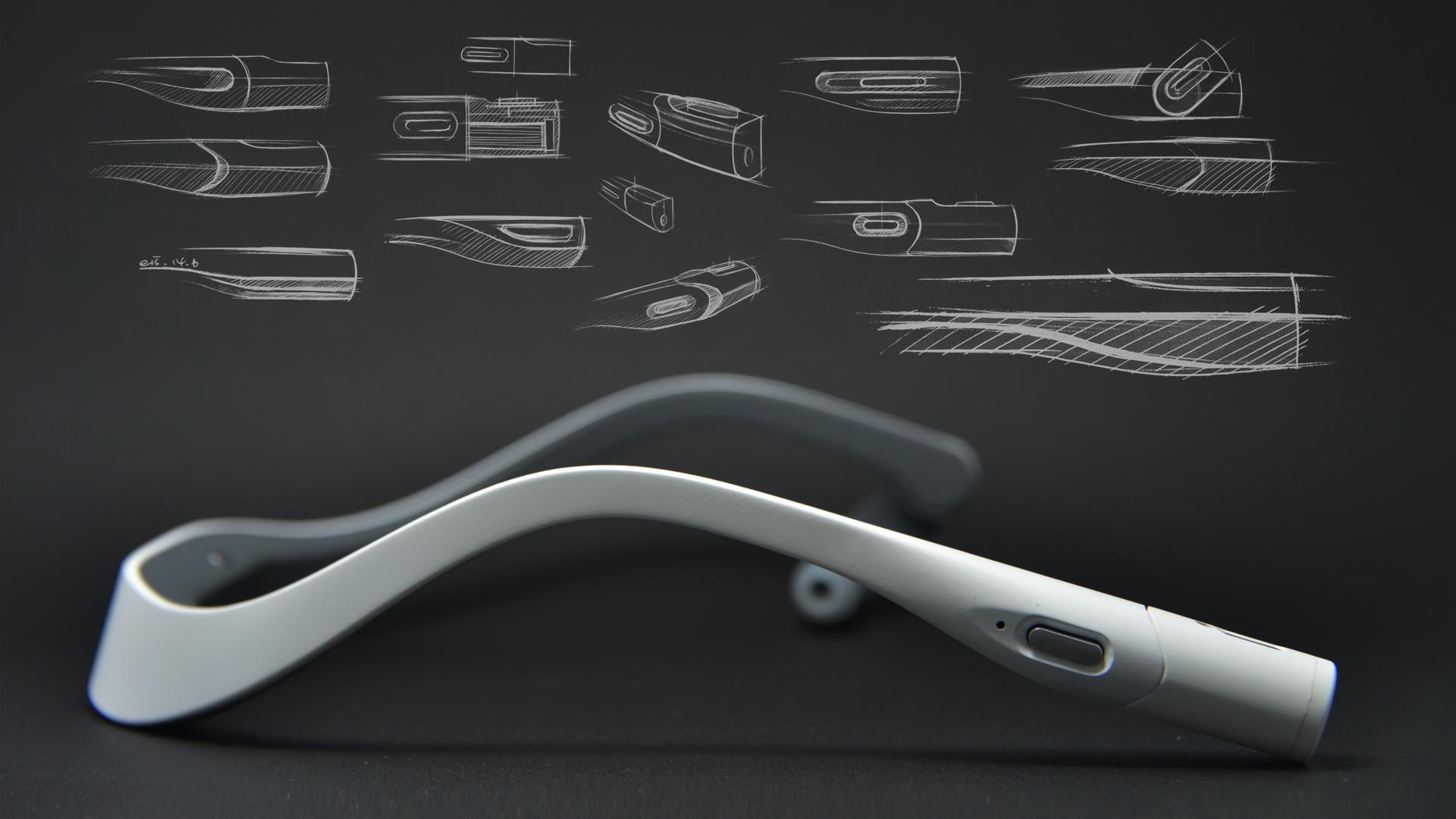This week, search engine giant Baidu, which in 2013 accounted for 63.55 percent of China’s search engine market, released a prototype for a new consumer-focused digital headset at its annual technology conference. Widely touted as a potential rival to Google Glass, in its current iteration it in fact seems more like a hands-free version of the Amazon Fire Phone’s Firefly feature, which allows the smartphone’s camera to recognize objects and shows the user how to buy them online.
The BaiduEye forgoes an across-the-eye screen in favor of a frame that rests around the back of the head, with an earpiece and forward-facing camera, digitally tethered to a smartphone app. According to a company spokesperson, BaiduEye allows the wearer to analyze items in her field of vision and provides information in the ear piece or in the app. Wearers can also use voice or gesture commands, such as circling an object with a finger in front of the camera. The lack of screen allows the BaiduEye to consume much less battery life, the company said, and it also means that people with eyeglasses can easily use the device.
Kaiser Kuo, Baidu’s director of international communications, told me that BaiduEye is a very early prototype and its image recognition abilities are limited, for the moment, to articles of clothing, hand bags, and plants. The ability to recognize hand bags and clothes and direct the consumer to ecommerce platforms clearly demonstrates the eventual commercial possibilities of the device, but why plants?
Plants were an interesting challenge Baidu set for itself, Kuo said. There’s a great diversity of plant life in the world, and although we see it every day, it’s also likely that the average person doesn’t have a particularly good flora vocabulary. “I know common trees and flowers, for example, but I wouldn’t know a peony from a snap dragon. It’s a challenging test for the technology,” he told me. “Our image-recognition technology, which is driven by accumulated data sets and deep learning, is now really good at recognizing plant life, and will only improve.”
He also suggested that the device allows for a very intuitive mode of search. “If you look at something and search for it, then it’s not exactly clear what your intent is—whether you want to buy it or whether you want historical information about it. But when you couple that with voice, you have a whole other dimension that lets you describe intent: “ ‘Tell me the history of this building,’ ” for example,” he said. “That’s why we wanted to combine image and voice driven search—you can have quite complex search ability.”
In fact, Baidu’s CEO Robin Li has said that he expects voice and picture-based online searches to outnumber text in five years, according to PC World.
This hands-free vision of search certainly seems uniquely useful as a shopping tool. Baidu’s recent purchase of IndoorAtlas Ltd., a Finnish mapping company that helps users find their way through indoor venues like malls, and its recent e-commerce deal with the Dalian Wanda Group, a Chinese retail conglomerate, suggest that the company is highly focused on finding new ways to facilitate commerce, both online and off. Perhaps even to taken on Alibaba, China’s biggest ecommerce platform, reports in the New York Times suggested.
But first people will have to want to wear the device. At first glance, BaiduEye is rather simple and elegant, and the fact that there’s no screen makes it’s less off-putting than otherwise. Perhaps the creep-factor that inspired so much anti-“glasshole” crime was in large part due to the covering of the eyes—a sense that the person could not help but be watching and filming. The BaiduEye, with its small, tendril-like camera on the wearer’s temple seems more visually surreptitious and much easier to get away with. Kuo also suggested that there was appeal in having such an unobtrusive device: “You can kind of forget you’re wearing it,” he said.
While Baidu does intend to make BaiduEye commercially available down the road, this prototype is not the final version and it has not yet identified a vendor. Baidu hasn’t set a price, either, although it won’t be as high as $1,500 (the current price of Google Glass), Kuo assured me.
Endless comparisons with Google Glass seem inevitable for BaiduEye as it comes to market, but the company also announced a unique new product this week that Google has not yet tackled: “smart chopsticks” that can detect dangerously contaminated cooking oil.
